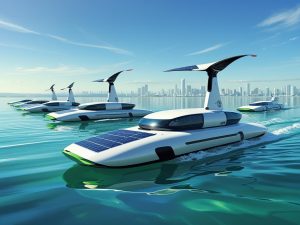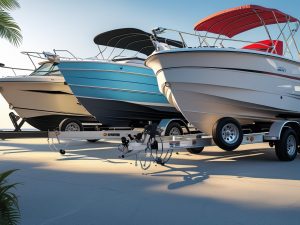
As the boating industry continues to evolve in 2025, understanding how boats and watercraft depreciate is more important than ever for buyers, sellers, and marine business owners. Whether you’re looking to buy your first fishing boat, upgrade to a luxury yacht, or determine the resale value of your jet ski, this detailed guide will help you grasp the key depreciation trends for boats and watercraft in 2025.
What Is Boat Depreciation?
Boat depreciation refers to the decline in the monetary value of a boat or watercraft over time. Like vehicles, boats begin losing value the moment they are purchased and continue to depreciate based on usage, age, condition, and market conditions.
Depreciation is especially important for:
-
Personal financial planning
-
Tax deductions for business use
-
Resale or trade-in decisions
-
Insurance valuation
-
Accounting for commercial fleets
Why Does Boat Depreciation Matter in 2025?
The year 2025 has brought unique dynamics to the marine market, influenced by:
-
Rising fuel and maintenance costs
-
Supply chain improvements post-COVID
-
Growing demand for electric and hybrid boats
-
New maritime regulations and technology
These factors are shaping how boats are valued and depreciated.
How Is Depreciation Calculated?
Boat depreciation can be calculated in several ways depending on usage and accounting purpose. The most common methods include:
1. Straight-Line Depreciation
This is the simplest method. It spreads the depreciation evenly over the useful life of the boat.
Formula:
(Purchase Price – Salvage Value) ÷ Useful Life
2. Declining Balance Method
This method applies a fixed depreciation rate to the book value each year, resulting in higher depreciation in earlier years.
3. MACRS (Modified Accelerated Cost Recovery System)
For businesses using boats commercially, MACRS is the IRS-approved method that allows for accelerated depreciation, especially in the first few years.
Average Lifespan of Different Watercraft
Understanding average lifespan helps determine depreciation periods:
| Boat Type | Average Lifespan (Years) |
|---|---|
| Inflatable Boats | 5–10 |
| Jet Skis (PWCs) | 8–10 |
| Fishing Boats | 10–15 |
| Pontoon Boats | 15–20 |
| Cabin Cruisers | 20–25 |
| Yachts | 25–30+ |
Average Depreciation Rates by Boat Type in 2025
Here’s a breakdown of average depreciation percentages for popular watercraft in 2025:
| Boat Type | 1st Year | 3rd Year | 5th Year | 10th Year |
|---|---|---|---|---|
| Jet Skis | 21% | 40% | 60% | 85% |
| Fishing Boats | 15% | 33% | 50% | 70% |
| Pontoon Boats | 10% | 25% | 40% | 65% |
| Cabin Cruisers | 10% | 20% | 35% | 55% |
| Yachts | 5% | 15% | 30% | 50% |
✅ Note: Luxury and custom-built boats depreciate slower due to craftsmanship and demand.
Factors That Influence Boat Depreciation in 2025
Several factors can increase or decrease the depreciation rate of a watercraft:
1. Brand and Build Quality
Premium brands like Sea Ray, Boston Whaler, and Yamaha typically retain value better.
2. Maintenance History
Well-maintained boats with service records depreciate slower.
3. Market Demand
In 2025, eco-friendly and electric boats are retaining value better due to sustainability trends.
4. Location
Saltwater usage causes faster wear and tear, accelerating depreciation.
5. Hours of Use
Like mileage in cars, higher engine hours reduce value more quickly.
6. Technological Obsolescence
Boats lacking modern features like GPS, radar, or hybrid engines depreciate faster in today’s tech-savvy market.
Special Depreciation in 2025: Section 179 Deduction
For commercial boat owners in the U.S., Section 179 of the IRS Code allows businesses to deduct the full cost of qualifying equipment (including boats) purchased and put into use in the same year.
-
Maximum deduction in 2025: $1,220,000
-
Phase-out threshold: $3,050,000
Eligibility Criteria:
-
Must be used more than 50% for business.
-
Not applicable to leisure/personal use boats.
-
Documentation and logbooks are crucial.
Depreciation Forecast: 2025–2030
As global marine trends evolve, here’s a depreciation outlook:
| Year | Depreciation Trend |
|---|---|
| 2025 | Steady due to economic normalization |
| 2026 | Slight dip as electric boats gain adoption |
| 2027 | Used boat prices may stabilize |
| 2028 | Increased regulation could accelerate depreciation |
| 2029 | Recession recovery expected to slow resale market |
| 2030 | Growth in charter sharing will help retain value |
Tips to Minimize Depreciation
While depreciation is inevitable, you can take steps to preserve value:
1. Store Properly
Protect boats from UV, moisture, and salt exposure with covered storage or dry docks.
2. Keep Detailed Maintenance Logs
Buyers pay more for boats with service records.
3. Limit Engine Hours
Avoid unnecessary operation to maintain resale appeal.
4. Update Features
Install new electronics, upholstery, and safety features regularly.
5. Buy Used Instead of New
Used boats already have absorbed major depreciation. A 2–3 year old vessel offers better value retention.
Used Boat Market Trends in 2025
The demand for used boats is rising in 2025 due to:
-
High inflation on new vessels
-
Rising interest rates on financing
-
Consumer interest in outdoor recreation post-pandemic
Boat owners selling within the first 3–5 years of ownership are experiencing higher losses than those who hold onto vessels for 7+ years.
Top Boat Brands That Hold Value in 2025
Here are top-performing brands for resale in 2025:
| Brand | Resale Score (/10) |
|---|---|
| Boston Whaler | 9.5 |
| Grady-White | 9.2 |
| Yamaha Boats | 9.0 |
| Sea Ray | 8.8 |
| Bennington | 8.7 |
| Lund | 8.5 |
Marine Insurance and Depreciation
Boat insurance policies often use Agreed Value or Actual Cash Value (ACV) methods.
-
Agreed Value locks in the boat’s value at the time of policy issuance (less impact from depreciation).
-
ACV policies pay the depreciated value of the boat at time of claim.
In 2025, many insurers are offering flexible hybrid policies—always read the fine print.
Depreciation and Boat Loans
Loan-to-value (LTV) ratios are crucial. Banks typically require a down payment of 10–20% because:
-
Boats depreciate rapidly in the first year.
-
Repossession value may not cover loan balance.
Tips:
-
Avoid long-term boat loans (over 10 years).
-
Consider putting more money down to avoid negative equity.
FAQs About Boat Depreciation in 2025
1. How much does a boat depreciate in the first year?
Most boats lose 10% to 20% of their value in the first year, depending on type and brand.
2. Which boats depreciate the least?
Yachts and premium brands like Boston Whaler, Grady-White, and Sea Ray tend to depreciate slower due to their build quality and demand.
3. Do electric boats depreciate differently in 2025?
Yes, electric and hybrid boats tend to hold value longer due to increasing demand and lower operating costs.
4. Is depreciation tax-deductible?
For business or commercial boats, depreciation is deductible under MACRS or Section 179. Personal watercraft used for leisure are not deductible.
5. What’s the best time to buy a boat to avoid high depreciation?
Buying used boats that are 2–3 years old is ideal. They’ve already absorbed the steepest depreciation.
6. Does saltwater use increase depreciation?
Yes, saltwater accelerates corrosion and wear, leading to higher depreciation rates.
7. How do I calculate depreciation for my boat?
You can use the straight-line method, or check marine valuation websites like NADA Guides, Boat Trader, or consult with a marine appraiser.
8. Is boat depreciation faster than car depreciation?
Yes, boats generally depreciate faster, especially recreational models like jet skis or inflatables.
9. Can depreciation affect boat insurance premiums?
Yes, the replacement cost and cash value used in policies are influenced by depreciation rates.
10. Will resale values improve post-2025?
Analysts expect slight improvement from 2026–2027, especially for energy-efficient or tech-updated boats.
Final Thoughts
Understanding boat and watercraft depreciation in 2025 is essential for making smart financial decisions. Whether you’re a private boat owner, dealer, or marine business, knowing how value changes over time can help reduce costs and increase returns. With the market becoming more eco-conscious and tech-driven, staying updated on depreciation trends will help you navigate the waters more confidently.







